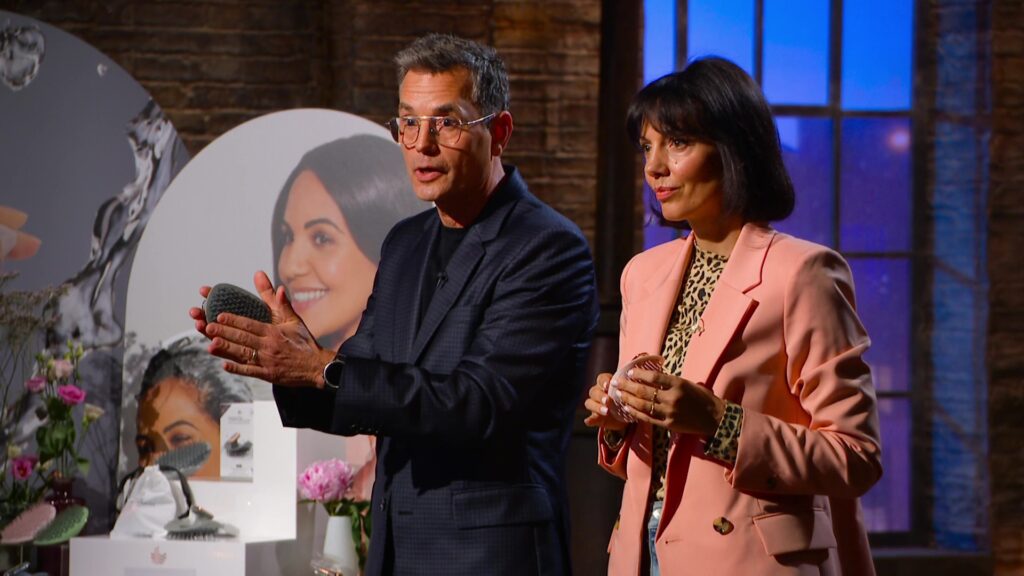Innovative ventures and intellectual property set the stage alight on Dragons' Den this week, with a wide variety of businesses seeking investment and advice from the Dragons' experienced judging panel. From a hair care revolution to dental hygiene for cats, the Den saw a variety of presentations, each with their own unique challenges and opportunities.

A 'hair' brained invention, or revolutionary hair and scalp care?
First up were Tim and Dani Binnington, the dynamic husband-and-wife duo behind Manta Hair. With a product aimed at minimising hair breakage and loss, the couple sought £240,000 for a 4% equity stake in their company. The Dragons, mindful of a previous miss with a similar product, Tangle Teezer, scrutinised the invention's uniqueness.
We decided to have patents in as many markets as possible...
You can view the patent for the Binningtons' flexible brush through this link.
Peter Jones acknowledged the couple's meticulous approach to intellectual property, lauding their investment in patents and other protective measures, commenting "You have done all of the right things, getting all your patents and doing all your IP".
Deborah Meaden expressed regret over passing on a comparable product in the past:
You’re great and the product is great. We turned down the Tangle Teezer brush and lived to regret it!

Despite multiple enticing offers, the Binningtons declined, leaving with their innovative hairbrush and a testament to the power of strategic IP planning.
For businesses like Manta Hair, securing design rights or patents can offer a quicker path to protection, ensuring the uniqueness of their product is safeguarded in the market.
If you're applying for a patent, make sure you haven't shared your invention publicly. If you've mentioned it in a speech, uploaded a photo to social media or displayed a prototype at a trade show, this could potentially stop your patent being granted. Consider using Non-Disclosure Agreements (NDAs), even if you’re speaking to investors.
Dental Wand: the cat's whiskers?
Victor Carpio entered the Den with a solution to a peculiar problem – cleaning a cat's teeth. Seeking £45,000 for a 10% share in Dental Wand, Victor faced early challenges as the product broke during the demonstration. However, Deborah Meaden, a lifelong cat owner, recognised the potential and offered all the money for 40% of the business. Touker Suleyman matched the offer, and Victor sealed the deal with fellow feline enthusiast Deborah.

Touker was feline sceptical:
This is a baby business and a big risk!
A quick check shows that Dental Wand has secured design rights for Dental Wand, showcasing the importance of protecting not only the functionality but also the visual aspects of a product.
When it isn't possible or cost effective to patent an invention, design registration may be the solution.
A registered design provides a number of benefits including the right to take legal action against any copies of your work. Although there’s no official symbol to indicate a design is registered (like a trade mark), you can still display the design number on the product. This may serve to deter people from creating a design similar to yours.
Sooper Books: a literary twist in the tale
In a literary finale, husband-and-wife duo Charlene and Simon Mitchell-Hood presented Sooper Books, an online collection of stories for children. With an ask of 1% for £1, the couple aim to translate their fourteen million views into a Den success story.

The Dragons, in a collective effort, gave a pound for 1%, resulting in the couple giving away 5% of their business but walking away with the support of all five Dragons. Along with royal investment in Princess Beatrice, and the Dragons' unanimous support, this showcased a fairy-tale ending for Sooper Books. History books are made with the lowest valuation and the smallest ask.
While it wasn't explicitly mentioned, it would be prudent for businesses like Sooper Books to consider registering their trade marks, especially if they have a distinctive moving visual element like their logo.
Your logo is an important aspect of your brand. You can trade mark a logo and use it as a marketing tool so that customers can more easily recognise your products or services. For consistency, many companies ensure their logo looks the same across their product range to build brand recognition. Furthermore, when you trade mark a logo, you are protecting that image specifically.
For those inspired by the Den, it's crucial to recognise the importance of intellectual property in safeguarding innovative ideas. Trade marks, patents, and copyright play a pivotal role in securing a brand's identity and ensuring its longevity in the competitive market. As showcased in the Den, protecting assets and understanding the marketplace are vital steps for any business aiming to make their own mark in the ever-evolving world of entrepreneurship.
Don’t forget to keep a look out for more upcoming editions as we follow the BBC Dragons' Den series.
If you are thinking about the intellectual property in your business, visit the IP for Business section of our website or sign up to receive regular updates.
Disclaimer:
The purpose of the IPO's Dragons' Den IP blog is to help identify the IP in entrepreneurs’ pitches and highlight how IP works, or could work, in the real-life examples featured. IPO’s authorship of this blog does not constitute its endorsement or sponsorship of any products, individuals or businesses referenced within it.
Leave a comment